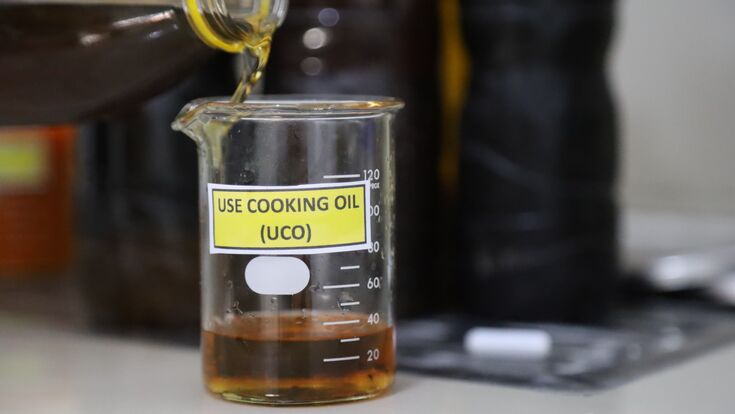Analysis on UCO : Demand for used cooking oil in Europe and the USA increasingly unsustainable

The world's leading producer of used cooking oil (UCO), China, is on the brink of depleting its waste oil supplies as European and US demand outpaces available resources, according to a new study by Transport & Environment (T&E), a leading non-profit organisation advocating clean transport and energy. The research, conducted by Stratas Advisors on behalf of T&E, evaluates the collection capacity of major UCO-producing countries and reveals that China already exports more than half of its UCO for use in European and US transportation. This is before the aviation sector is projected to triple its UCO demand by 2030 to meet sustainable aviation fuel (SAF) targets. T&E advocates for restrictions on unsustainable and questionable UCO imports.
Europe consumes 130,000 barrels of used cooking oil daily, eight times its collection rate. With the US now using 40,000 barrels a day following the implementation of Biden's Inflation Reduction Act, both regions are increasingly importing UCO from China, Indonesia, and Malaysia. The EU at present imports more than 80% of its UCO, with China alone accounting for 60% of these imports. However, as airlines join the fray, demand is surpassing sustainable collection capacities.
Cian Delaney, biofuels campaigner at T&E, stated, "Europe simply cannot collect enough used cooking oil to fly its planes. Ryanair's targets for 2030 alone would need all of Europe’s UCO, while all the UCO in China won’t be enough to decarbonize the continent’s airlines, cars, and trucks either. UCO is not a silver bullet and can only play a limited role in decarbonizing the transport sector. Europe needs to stop shipping waste oil across the world and limit itself to what it can collect at home."
Fraudulent labelling
The global demand for UCO is set to surge as aviation fuel targets take effect. Ryanair's goal to run 12.5% of its flights on UCO by 2030 would require all the UCO in Europe. Meeting global SAF targets in 2030 would necessitate at least double the UCO that can be collected in the US, Europe, and China combined, the study indicates.
The study also highlights potential fraud. While China's collection capacity and export levels seem to align, the existence of a large illegal gutter oil market suggests significant domestic consumption of UCO. This implies that China might be using and exporting more UCO than it collects, raising suspicions of virgin vegetable oil being mislabeled as waste oil.
Data shows that Malaysia, a major palm oil producer, exports three times more UCO than it collects. Much of this UCO passes through the Netherlands or goes to the UK, which has one of the highest SAF targets. Delaney added, "The fact Malaysia exports three times more UCO than it collects shows that fraud is almost certainly happening on a mass scale. With Malaysia being one of the world’s largest palm oil producers, it would heavily indicate that UCO is simply a backdoor for palm." As is well known, palm oil production is strongly linked to deforestation.
Stratas' data also indicates that collecting UCO in Asia is about 30% cheaper than in Europe. Over the past two years, the European biofuels market has been inundated with UCO imports from China, causing the market price to plummet from around € 2,250 per tonne to € 1,100.
T&E suggests that Europe could potentially double its UCO collection if cheap Chinese imports were reduced.
Stratas attributes the influx of adulterated UCO and UCO biodiesel in Europe to a mix of self-declarations and inadequate testing of raw materials at biofuel production sites. T&E calls for the EU to move away from independent, industry-led voluntary schemes towards stricter EU and national government regulation and controls. Additionally, T&E urges governments to exclude imported UCO from sustainability targets to prevent the mislabeling of virgin oils like palm as 'used.'
Call for more stringent regulation
The European Commission reacted to the situation by imposing anti-dumping anti-dumping tariffs of up to 36.4% on biodiesel imports from China. Non-profits like T&E welcomed this measure as a step in the right direction for limiting imports of dubious used cooking oil (UCO) biofuels. Although they point out, that this will not be enough to prevent fraudulently mislabeled palm oil from entering the European market.
Cian Delaney said: “Europe is completely overreliant on unverifiable used cooking oil from distant countries, like China. Restrictions on imports from China are a step in the right direction, however, anti-dumping tariffs alone won’t be enough to tackle UCO fraud. Without a complete overhaul of the certification process, the EU will continue to play out a game of whack-a-mole as fraudsters from other countries will simply fill the gap. The EU needs to stop incentivising unverifiable, imported waste oils and move away from an industry-led verification system towards more stringent regulation.”



